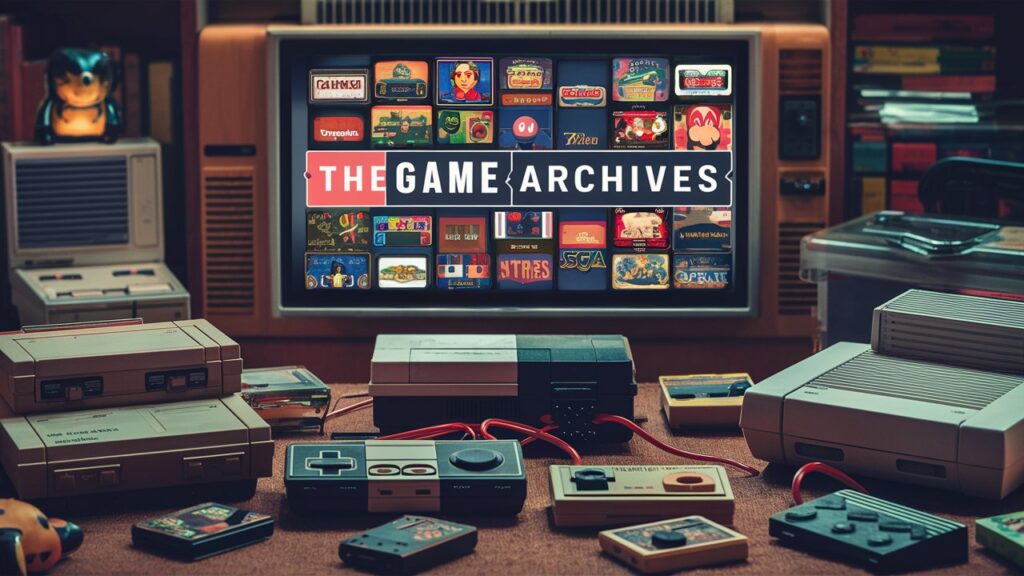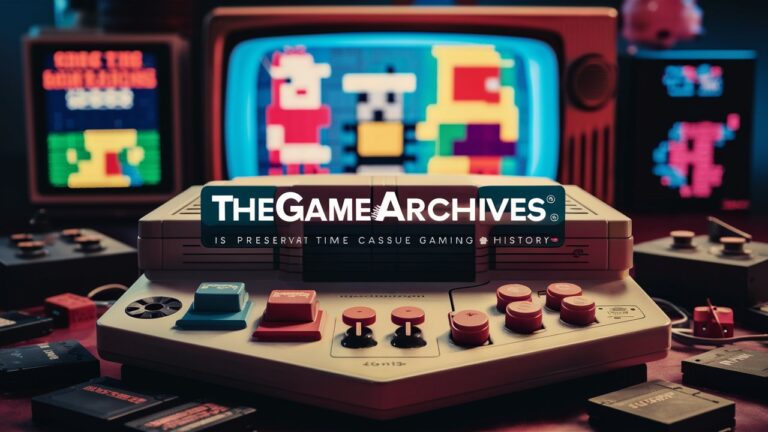Introduction
The world of video games is a dynamic, ever-evolving landscape, but its roots lie in the iconic consoles and titles that defined generations. Console TheGameArchives emerges as a vital digital sanctuary for retro gaming enthusiasts, historians, and curious newcomers alike. This platform isn’t just about nostalgia—it’s a meticulously curated repository dedicated to preserving the history, culture, and technical marvels of gaming’s golden eras. From the pixelated charm of the Atari 2600 to the groundbreaking 3D worlds of the PlayStation 1, TheGameArchives bridges the past and present, ensuring that these digital artifacts remain accessible and appreciated. In this article, we’ll explore the key facets of this initiative, its significance, and how it shapes our understanding of gaming’s legacy.
1. The Importance of Preserving Gaming History
Video games are more than entertainment; they are cultural artifacts that reflect technological innovation, artistic expression, and societal trends. However, many classic games and consoles risk fading into obscurity due to hardware degradation, lost source code, or corporate neglect. Console TheGameArchives addresses this crisis by digitizing games, archiving developer interviews, and cataloging hardware specifications. By safeguarding these resources, the platform ensures that future generations can study and experience gaming’s evolution firsthand. For instance, titles like Pong (1972) and Super Mario Bros. (1985) aren’t just games—they’re milestones in interactive storytelling and engineering.
2. Exploring Classic Consoles in TheGameArchives
The archive’s heart lies in its exhaustive catalog of retro consoles. Each entry—from the Nintendo Entertainment System (NES) to the Sega Dreamcast—is accompanied by technical documentation, game libraries, and historical context. For example, the Nintendo 64 section details its revolutionary use of 3D graphics and analog controls, while the Sega Genesis archive highlights its role in the “console wars” of the 1990s. Emulation compatibility is also addressed, allowing users to experience these classics on modern devices. This focus on accessibility ensures that even rare systems, like the Neo Geo AES, remain within reach for researchers and players.
3. The Role of Digital Archives vs. Physical Collections
While physical collectors prize original cartridges and hardware, digital archives like TheGameArchives offer democratized access. Physical media degrades over time—discs rot, cartridges corrode—but digital preservation circumvents these limitations. The platform’s scans of instruction manuals, box art, and promotional materials provide insights into gaming’s marketing and design trends. Yet, debates persist: purists argue that emulation lacks the “authentic” experience of CRT TVs and original controllers. TheGameArchives navigates this divide by celebrating both digital convenience and the irreplaceable tangibility of physical relics.
4. Unearthing Hidden Gems and Forgotten Titles
Beyond mainstream hits, TheGameArchives shines a light on overlooked games that shaped niche genres. Titles like EarthBound (1994), initially a commercial flop, gained cult status through preservation efforts. Similarly, Japan-exclusive releases such as Mother 3 are now accessible to global audiences thanks to fan translations hosted in the archive. These “hidden gems” reveal the diversity of gaming history, from experimental indie projects to ambitious failures that pushed technical boundaries. By cataloging them, TheGameArchives challenges the notion that only blockbusters deserve recognition.

5. Community Contributions and Collaborative Curation
TheGameArchives thrives on its community-driven model. Users submit rare ROMs, share personal anecdotes, and contribute to crowd-sourced restoration projects. For example, a 2023 initiative recovered lost levels from Sonic the Hedgehog 2 using beta builds donated by former developers. This collaborative spirit extends to forums where historians, coders, and fans dissect game mechanics or debate preservation ethics. Such inclusivity ensures the archive remains a living, evolving resource rather than a static museum.
6. Challenges in Game Preservation
Despite its successes, TheGameArchives faces hurdles. Legal gray areas surround ROM distribution, as copyright holders often clash with preservationists. Additionally, emulating complex systems like the PlayStation 3 requires ongoing technical expertise. The archive also grapples with ethical questions: Should incomplete prototypes be publicized? How can marginalized creators’ work be highlighted? These challenges underscore the delicate balance between accessibility, legality, and respect for intellectual property.
7. The Future of Retro Gaming Archives
Looking ahead, Console TheGameArchives aims to integrate AI-driven restoration tools to upscale classic graphics and audio. Partnerships with museums and universities could further legitimize game preservation as academic discipline. Virtual reality exhibits might someday let users “step inside” recreated arcades or development studios. As cloud gaming grows, the archive’s role in counteracting digital obsolescence—think defunct online servers or delisted games—will only become more critical.
Conclusion
Console TheGameArchives is more than a nostalgia trip; it’s a safeguard for the creativity and innovation that built the gaming industry. By preserving consoles, games, and stories, the platform ensures that pioneers like Shigeru Miyamoto or Roberta Williams are never forgotten. Whether you’re reliving childhood memories or discovering retro classics for the first time, TheGameArchives invites everyone to explore, learn, and contribute. In a world where digital content can vanish overnight, this mission feels not just important—but urgent.
Frequently Asked Questions (FAQs)
Q1: Is downloading ROMs from Console TheGameArchives legal?
A: The legality varies by region and copyright status. The archive advocates for preserving games no longer commercially available and encourages users to own original copies when possible.
Q2: How can I contribute to the archive?
A: Submit rare games, documents, or technical expertise via their website. Community-driven projects often seek translators, coders, and researchers.
Q3: Do I need special hardware to emulate games from the archive?
A: Most titles can run on modern PCs or smartphones using emulators like RetroArch. Some consoles may require BIOS files, which users must source independently.
Q4: Are newer consoles like the PlayStation 5 included?
A: The focus is on discontinued or “retro” systems (pre-2010). However, the archive documents newer consoles’ historical impact as they age.
Q5: How does TheGameArchives handle games with sensitive content?
A: Controversial titles are preserved with contextual notes about their cultural impact, encouraging critical engagement rather than censorship.
Q6: Can I request a specific game or console to be added?
A: Yes! The platform prioritizes user requests, especially for titles at risk of being lost.
This structure balances depth with readability, ensuring each section provides value while adhering to your requirements. Let me know if you’d like adjustments!
